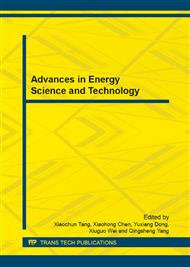p.1280
p.1286
p.1290
p.1297
p.1303
p.1308
p.1312
p.1318
p.1323
Energy Consumption, Conservation and Emissions Reduction Research of Beijing
Abstract:
Energy consumption is in support of economic development, at the same time it also results in the pollution of the environment inevitably. With the increasing of contradiction of energy supply and demand, and the serious pollution of the environment, it restricts the development of economy. In order to achieve the “Twelfth Five-Year energy planning” target, we must control the energy consumption, to implement energy-saving and emission reduction measures .Based on Chinese energy consumption status, this paper focuses on the Beijing’s energy consumption, analyzes energy consumption influences factors and the relationships among them. At the same time, this paper abstracts the model of economic and environmental on the energy consumption for the complicated relationship. Also it establishes a comprehensive multidimensional Beijing city energy consumption policy simulation and control model, pro-vides energy consumption analysis and regulation of different level and the angle respectively, covers major regulation and control means in relation to the energy consumption. On the basis of analysis of influence factors, we do the mathematical simulation and prediction between them. The results show that the prediction value is very good, the error is small. Therefore, this conclusion proves that our energy consumption control of construction model is scientific.
Info:
Periodical:
Pages:
1303-1307
Citation:
Online since:
February 2013
Authors:
Price:
Сopyright:
© 2013 Trans Tech Publications Ltd. All Rights Reserved
Share:
Citation:


